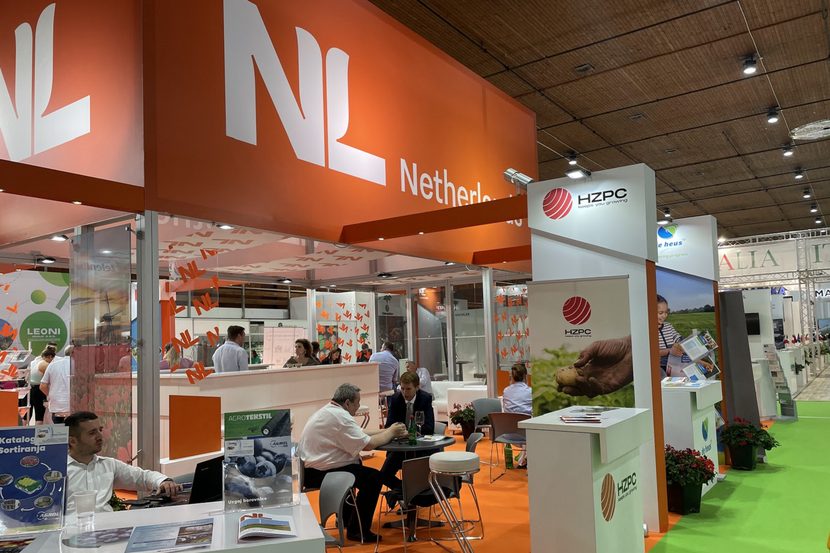Serbia: Orange Pavilion at the Novi Sad Fair 2024
Announcing the Orange Pavilion; news of the poultry and horticulture import and export; reforestation; and improving the commodity exchange market - Our weekly briefing on agriculture, food and nature news in Serbia

Join the Orange Pavilion at the biggest agriculture fair in the Western Balkans
In 2024, between May 18-23, the Novi Sad will host its 91st International Agriculture Fair. This event is the oldest and the most important agricultural fair in the Western Balkans. It attracts up to 300 thousand visitors and is frequented by high-level government officials and decision makers from the wider region, making it an excellent opportunity to showcase your business to potential customers, partners and other stakeholders.
This year too, the agricultural team of the Netherlands Embassy in Belgrade aims to organize an Orange Pavilion open to Dutch companies that wish to showcase the very best the Netherlands has to offer to the agri-food industries of the Western Balkans.
The Orange Pavilion is a tried and tested concept with clear added value for Dutch businesses. Participation ensures maximum exposure for your business as the national stand receives a great deal of attention from government officials, media and the business community. The Embassy will furthermore organize networking events and a seminar to provide a platform for you to connect with potential partners. Additionally, we will be taking care of all logistics of organizing the joint stand. If you are interested in joining or would like more information, please contact us at BEL-LNV@minbuza.nl
Opening the EU market would double Serbian poultry production
Poultry production in Serbia is increasing and production growth has been recorded in recent years. In 2022, poultry production amounted around 116,000 tons, which is 4% more than the previous year and 7.3% higher than the five-year average, stated the Ministry of Agriculture of Serbia. “Last year was difficult for poultry producers, but in last couple of months business is gradually stabilizing. Production costs have started to decrease and hopefully the business will remain viable in 2024. Domestic production fully covers domestic market needs and I think that Serbia has serious potential for the export of poultry meat to the EU” stated Mr. Ivan Stanojlović, President of the Association of Poultry Farmers of Serbia, for AgroTV. Opening the European market for Serbian poultry farmers would almost double its production, Stanojlović estimated.
Raspberry export up to €240 million in first 10 months
From January 1 to October 31 this year, Serbia exported 845 tons of fresh raspberries, valued almost €1.7 million, reports the Statistical Office of Serbia (RZS). As for frozen raspberry export, by the end of October, 57,612 tons were exported with a total value of just over €237 million. The destinations to which Serbia most commonly exports to are: Germany, Belgium, the Netherlands and the USA. Regarding the import/export ratio of fruit to and from Ukraine, which is often underlined as the reason for the problem with market prices of certain fruits (and other agricultural commodities), according to the data of RZS, during the first ten months of 2023, Serbia imported 714 tons of fruit from Ukraine (a value of almost two million euros), and exported 553 tons of fruits to Ukraine (with a value less than half a million euros).
Regarding the entire fruit sector, in the first ten months of 2023, Serbia exported 316,790 tons of fruit and imported 234,673 tons (mostly tropical and exotic fruits). The total value of exported fruits was approximately €622 million while the value of imported fruit was close to €245 million.
1.000 hectares reforested in the last five years
According to the latest data from the Ministry of Environmental Protection, about 1.000 hectares have been reforested in more than 60 cities and municipalities in Serbia as part of the reforestation projects from 2018 to 2023. However, only about seven percent of the area in Vojvodina is covered by forests, which makes this part of Serbia the least forested region in Europe. Vojvodina is predominantly an agricultural region. Environmentalists claim that the problem could be solved if the owners of agricultural land, including the state, would be ready to give up the immediate benefits and focus more on long-term effects.
Commodity Exchange is the main topic of discussion in the government
The first meeting of the governmental working group for the market improvement of the commodity exchange of agricultural products took place this week. The group is to coordinate activities for improving commodity-market operations related to agricultural products. The Minister of Agriculture and the Minister of Trade were present at the meeting.
The main topic of discussion during the meeting was the establishment of a free grain market. Representatives of agricultural associations were satisfied with the outcome of the meeting. "The main topic of discussion was how to organize and implement the free grain market, future contracts for our products and storage conditions in public warehouses," said Daniel Kovacic, a member of the Board of Directors of the Initiative for the Survival of Farmers in Serbia. He added that farmers requested the opportunity for term sales of their products and that the confirmation of deposited grain in public warehouses should be treated as a financial instrument, based on which they can sell stored goods or take loans from banks.
The Ministry of Agriculture stated that existing laws would be analyzed and proposals for regulatory changes would be taken into consideration in order to find the best solution for the forward sale of agricultural products. Daniel Kovacic said that there were 15 representatives of agricultural associations at the meeting, as well as representatives of several ministries. He said that government representatives promised to work on improvement of rules and regulations in order that some results could be seen within coming six months.